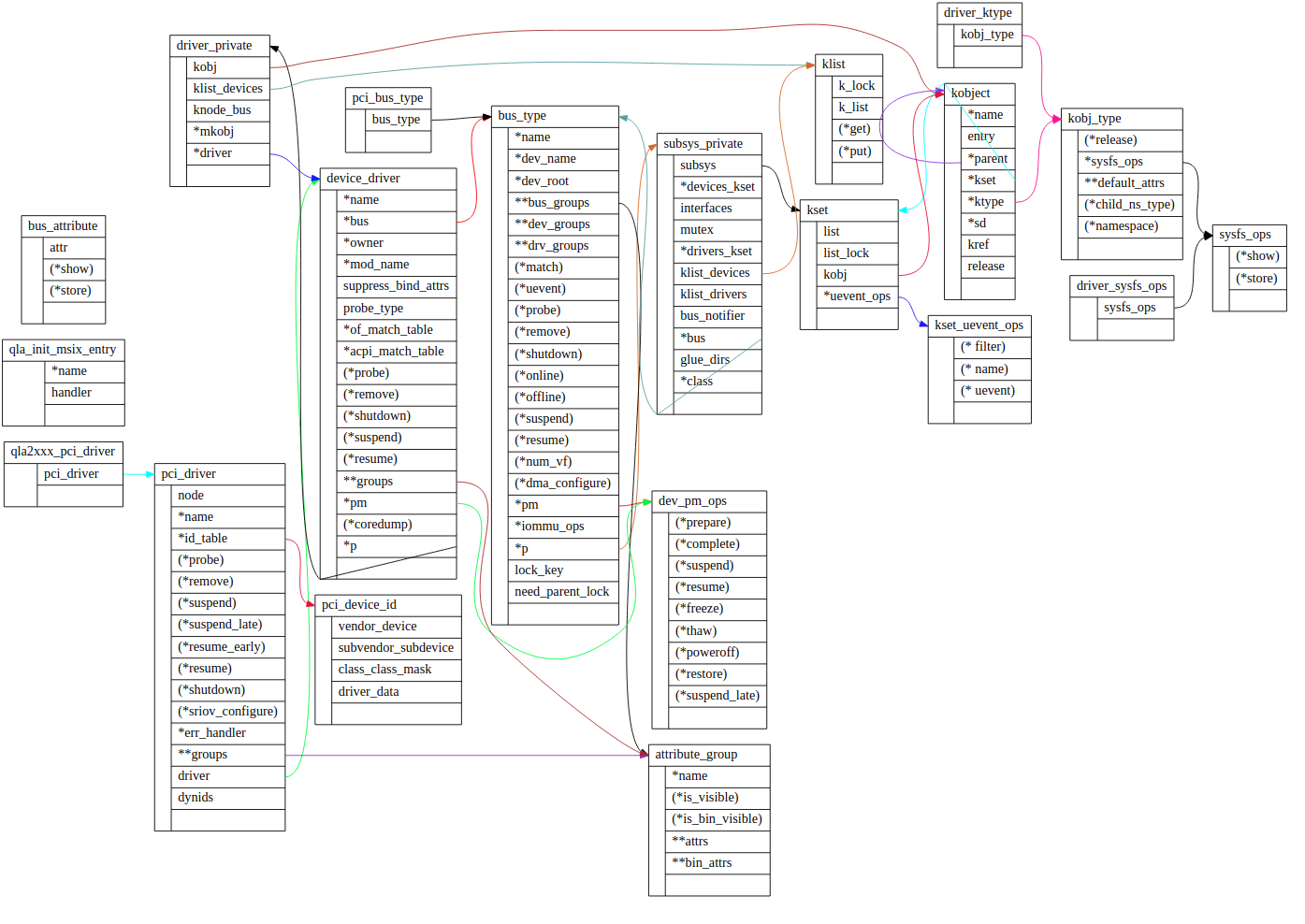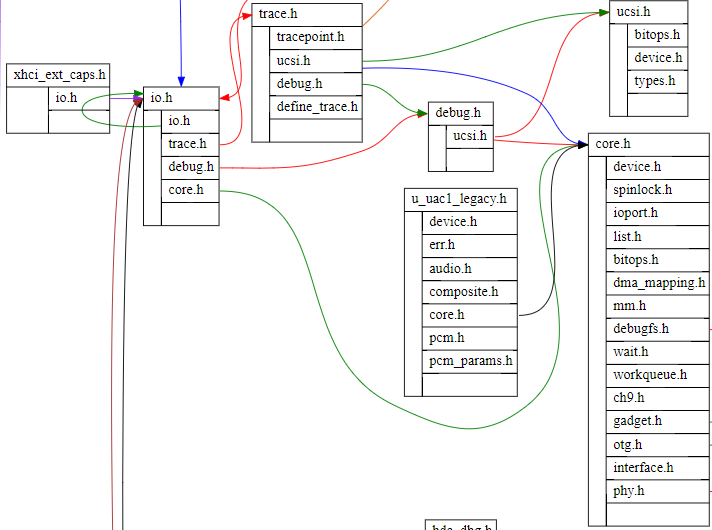| 利用python+graphviz绘制数据结构关系图和指定目录下头文件包含关系图 | 您所在的位置:网站首页 › python 画依赖图 › 利用python+graphviz绘制数据结构关系图和指定目录下头文件包含关系图 |
利用python+graphviz绘制数据结构关系图和指定目录下头文件包含关系图
|
作为一名linux系统下的C语言开发,日常工作中经常遇到两个问题: 一是分析代码过程中,各种数据结构互相关联,只通过代码很难理清系统中所有结构体的整体架构,影响代码消化的效率; 二是多层头文件嵌套包含,在新增需要被多处引用的结构体或者函数接口时,难以找到合适的地方放置结构体和函数接口的定义。 为解决这两个问题,用python分别写了两个脚本: 第一个脚本用于绘制关键数据结构的关联关系图,协助快速理解组织架构,加速理解代码逻辑; 第二个脚本用于分析指定目录下的头文件包含关系,协助新增结构体或者函数接口时快速找到合适的放置位置; 两个脚本绘图效果分别见下图1,图2。
图1.数据结构关联关系图
图2.头文件包含关系图(截取部分) 以下代码是用于分析结构体关联关系的python脚本(analysis_data_struct.py),使用方法如下: 1.在电脑上安装python和graphviz绘图工具(自行搜索,安装方法略); 2.把需要绘制关系图的关键数据结构复制粘贴到一个文本文件中; 3.把脚本中的保存数据结构文件路径(G:\git_repository\libreofficedraw\linux_4.18\plfc_struct )替换为自己的保存数据结构的文件路径(可自行修改脚本,通过参数传入文件路径); 4.执行命令 python analysis_data_struct.py >tmpfile; dot -Tsvg tmpfile -o xxxx.svg; 其中第一条命令使用python分析数据结构并生成用于绘图的dot语言,第二条命令利用graphviz根据tmpfile中的dot语言描述绘图。图形保存到xxxx.svg文件中;可以使用浏览器打开。 #!/usr/bin/python3 import os,re prefix = '''digraph spdk { graph [ rankdir = "LR" //splines=polyline //overlap=false ]; node [ fontsize = "16" shape = "ellipse"\r ]; edge [ ]; ''' middle_str = '' edge_list = [] edge_string = '' cur_indentation_level = 0 space4 = ' ' space8 = space4 + space4 space12 = space4 + space8 space16 = space4 + space12 node_database = {} node_database['created'] = [] color_arrary = ['red', 'green', 'blue', 'black','blueviolet','brown', 'cadetblue','chocolate','crimson','cyan','darkgrey','deeppink','darkred'] with open(r'G:\git_repository\libreofficedraw\linux_4.18\plfc_struct', 'r') as file_input: tmpline = file_input.readline() while(tmpline): tmpline = re.sub(r'([^a-zA-Z0-9]const )', ' ', tmpline) #for match :struct device { if re.search(r'struct\s*([0-9a-zA-Z_\-]+)\s*\{', tmpline): m = re.search(r'struct\s*([0-9a-zA-Z_\-]+)\s*\{', tmpline) cur_indentation_level += 1 if (cur_indentation_level == 1): node_name = m.group(1) node_str = space4 + '\"' + node_name + '\" [\n' + space8 + 'label = \" '+ node_name +'\l|\n' + space12 + '{|{\n' node_database['created'].append(node_name) try: node_database[node_name]['node_str'] = node_str except: node_database[node_name] = {} node_database[node_name]['node_str'] = node_str #for match :struct device *parent; elif re.search(r'struct\s*([0-9a-zA-Z_\-]+)\s*(\**)(\s*)([0-9a-zA-Z_\-]+)\s*;', tmpline) and cur_indentation_level > 0: m = re.search(r'struct\s*([0-9a-zA-Z_\-]+)\s*(\**)(\s*)([0-9a-zA-Z_\-]+)\s*;', tmpline) member_type = m.group(1) node_database[node_name]['node_str'] += space16 + ' ' + m.group(2) + m.group(3) + m.group(4) + '\l|\n' try: node_database[member_type]['included_by'].append(node_name) except: try: node_database[member_type]['included_by'] = [] node_database[member_type]['included_by'].append(node_name) except: node_database[member_type] = {} node_database[member_type]['included_by'] = [] node_database[member_type]['included_by'].append(node_name) #print('%s included by %s'%(member_type, node_database[member_type]['included_by'])) if(member_type in node_database['created']): tmp_edge_str = space4 + node_name + ':' + member_type + ' -> ' + member_type + ':' + 'head' if not tmp_edge_str in edge_list: edge_list.append(tmp_edge_str) #for match : void *driver_data; elif re.search(r'\s*[0-9a-zA-Z_\-]+\s*(\**[0-9a-zA-Z_\-]+)\s*;', tmpline) and cur_indentation_level > 0: m = re.search(r'\s*[0-9a-zA-Z_\-]+\s*(\**[0-9a-zA-Z_\-]+)\s*;', tmpline) node_database[node_name]['node_str'] += space16 + ' ' + m.group(1) + '\l|\n' #for match:const char *init_name; elif re.search(r'(.*)\s+(\**)(\s*)([0-9a-zA-Z_\-]+\s*);', tmpline) and cur_indentation_level > 0: m = re.search(r'(.*)\s+(\**)(\s*)([0-9a-zA-Z_\-]+\s*);', tmpline) node_database[node_name]['node_str'] += space16 + ' ' + m.group(2) + m.group(3) + m.group(4) + '\l|\n' #for match:int *(*runtime_idle)(struct device *dev); elif re.search(r'\s*[0-9a-zA-Z_\-]+\s*\**\s*\(\s*(\**\s*[0-9a-zA-Z_\-]+)\s*\)\s*\([^\)]*\)\s*;', tmpline) and cur_indentation_level > 0: m = re.search(r'\s*[0-9a-zA-Z_\-]+\s*\**\s*\(\s*(\**\s*[0-9a-zA-Z_\-]+)\s*\)\s*\([^\)]*\)\s*;', tmpline) node_database[node_name]['node_str'] += space16 + ' (' + m.group(1) + ')\l|\n' #for match: }; elif re.search(r'\s*\}\s*;', tmpline): if(cur_indentation_level >= 1): cur_indentation_level -= 1 if (cur_indentation_level == 0): node_database[node_name]['node_str'] += space12 + '}}\"\n' node_database[node_name]['node_str'] += space8 + 'shape = \"record\"\n' + space4 + '];\n' if 'included_by' in node_database[node_name]: for parent_node in node_database[node_name]['included_by']: if parent_node in node_database['created']: tmp_edge_str = space4 + parent_node + ':' + node_name + ' -> ' + node_name + ':' + 'head' if not tmp_edge_str in edge_list: edge_list.append(tmp_edge_str) tmpline = file_input.readline() for tmpnode in node_database['created']: middle_str = middle_str + node_database[tmpnode]['node_str'] for i, tmpstr in enumerate(edge_list): edge_string += tmpstr + '[color="' + color_arrary[i%len(color_arrary)] + '"]\n' print(prefix + middle_str + '\n' + edge_string + '}')
以下为记录数据结构的文本文件(plfc_struct),用于测试。 struct bus_type { const char *name; const char *dev_name; struct device *dev_root; const struct attribute_group **bus_groups; const struct attribute_group **dev_groups; const struct attribute_group **drv_groups; int (*match)(struct device *dev, struct device_driver *drv); int (*uevent)(struct device *dev, struct kobj_uevent_env *env); int (*probe)(struct device *dev); int (*remove)(struct device *dev); void (*shutdown)(struct device *dev); int (*online)(struct device *dev); int (*offline)(struct device *dev); int (*suspend)(struct device *dev, pm_message_t state); int (*resume)(struct device *dev); int (*num_vf)(struct device *dev); int (*dma_configure)(struct device *dev); const struct dev_pm_ops *pm; const struct iommu_ops *iommu_ops; struct subsys_private *p; struct lock_class_key lock_key; bool need_parent_lock; }; struct pci_driver { struct list_head node; const char *name; const struct pci_device_id *id_table; /* Must be non-NULL for probe to be called */ int (*probe)(struct pci_dev *dev, const struct pci_device_id *id); /* New device inserted */ void (*remove)(struct pci_dev *dev); /* Device removed (NULL if not a hot-plug capable driver) */ int (*suspend)(struct pci_dev *dev, pm_message_t state); /* Device suspended */ int (*suspend_late)(struct pci_dev *dev, pm_message_t state); int (*resume_early)(struct pci_dev *dev); int (*resume) (struct pci_dev *dev); /* Device woken up */ void (*shutdown) (struct pci_dev *dev); int (*sriov_configure) (struct pci_dev *dev, int num_vfs); /* On PF */ const struct pci_error_handlers *err_handler; const struct attribute_group **groups; struct device_driver driver; struct pci_dynids dynids; }; struct device_driver { const char *name; struct bus_type *bus; struct module *owner; const char *mod_name; /* used for built-in modules */ bool suppress_bind_attrs; /* disables bind/unbind via sysfs */ enum probe_type probe_type; const struct of_device_id *of_match_table; const struct acpi_device_id *acpi_match_table; int (*probe) (struct device *dev); int (*remove) (struct device *dev); void (*shutdown) (struct device *dev); int (*suspend) (struct device *dev, pm_message_t state); int (*resume) (struct device *dev); const struct attribute_group **groups; const struct dev_pm_ops *pm; void (*coredump) (struct device *dev); struct driver_private *p; }; struct driver_private { struct kobject kobj; struct klist klist_devices; struct klist_node knode_bus; struct module_kobject *mkobj; struct device_driver *driver; }; struct kobject { const char *name; struct list_head entry; struct kobject *parent; struct kset *kset; struct kobj_type *ktype; struct kernfs_node *sd; /* sysfs directory entry */ struct kref kref; #ifdef CONFIG_DEBUG_KOBJECT_RELEASE struct delayed_work release; #endif unsigned int state_initialized:1; unsigned int state_in_sysfs:1; unsigned int state_add_uevent_sent:1; unsigned int state_remove_uevent_sent:1; unsigned int uevent_suppress:1; }; struct subsys_private { struct kset subsys; struct kset *devices_kset; struct list_head interfaces; struct mutex mutex; struct kset *drivers_kset; struct klist klist_devices; struct klist klist_drivers; struct blocking_notifier_head bus_notifier; unsigned int drivers_autoprobe:1; struct bus_type *bus; struct kset glue_dirs; struct class *class; }; struct kset { struct list_head list; spinlock_t list_lock; struct kobject kobj; const struct kset_uevent_ops *uevent_ops; }; struct kobj_type { void (*release)(struct kobject *kobj); const struct sysfs_ops *sysfs_ops; struct attribute **default_attrs; const struct kobj_ns_type_operations *(*child_ns_type)(struct kobject *kobj); const void *(*namespace)(struct kobject *kobj); }; struct sysfs_ops { ssize_t (*show)(struct kobject *, struct attribute *, char *); ssize_t (*store)(struct kobject *, struct attribute *, const char *, size_t); }; struct dev_pm_ops { int (*prepare)(struct device *dev); void (*complete)(struct device *dev); int (*suspend)(struct device *dev); int (*resume)(struct device *dev); int (*freeze)(struct device *dev); int (*thaw)(struct device *dev); int (*poweroff)(struct device *dev); int (*restore)(struct device *dev); int (*suspend_late)(struct device *dev); }; struct kset_uevent_ops { int (* const filter)(xxxxxxx); const char *(* const name)(struct kset *kset, struct kobject *kobj); int (* const uevent)(struct kset *kset, struct kobject *kobj, struct kobj_uevent_env *env); }; struct qla_init_msix_entry { const char *name; irq_handler_t handler; }; struct attribute_group { const char *name; umode_t (*is_visible)(struct kobject *, struct attribute *, int); umode_t (*is_bin_visible)(struct kobject *,struct bin_attribute *, int); struct attribute **attrs; struct bin_attribute **bin_attrs; }; struct bus_attribute { struct attribute attr; ssize_t (*show)(struct bus_type *bus, char *buf); ssize_t (*store)(struct bus_type *bus, const char *buf, size_t count); }; struct klist { spinlock_t k_lock; struct list_head k_list; void (*get)(struct klist_node *); void (*put)(struct klist_node *); } ; struct pci_device_id { __u32 vendor_device; /* Vendor and device ID or PCI_ANY_ID*/ __u32 subvendor_subdevice; /* Subsystem ID's or PCI_ANY_ID */ __u32 class_class_mask; /* (class,subclass,prog-if) triplet */ kernel_ulong_t driver_data; /* Data private to the driver */ }; struct device { struct device *parent; struct device_private *p; struct kobject kobj; const char *init_name; /* initial name of the device */ const struct device_type *type; struct mutex mutex; /* mutex to synchronize calls to * its driver. */ struct bus_type *bus; /* type of bus device is on */ struct device_driver *driver; /* which driver has allocated this device */ void *platform_data; /* Platform specific data, device core doesn't touch it */ void *driver_data; /* Driver data, set and get with dev_set/get_drvdata */ struct dev_links_info links; const struct attribute_group **groups; /* optional groups */ void (*release)(struct device *dev); struct iommu_group *iommu_group; struct iommu_fwspec *iommu_fwspec; }; struct dev_links_info { struct list_head suppliers; struct list_head consumers; enum dl_dev_state status; }; struct pci_dynids { spinlock_t lock; /* Protects list, index */ struct list_head list; /* For IDs added at runtime */ }; ////////////////////以下结构体名称为全局变量,结构体成员为全局变量的类型,用于绘图时关联全局变量及其类型/////////////////////// struct qla2xxx_pci_driver { struct pci_driver pci_driver; }; struct pci_bus_type { struct bus_type bus_type; }; struct driver_ktype { struct kobj_type kobj_type; }; struct driver_sysfs_ops { struct sysfs_ops sysfs_ops; }; struct qla2xxx_pci_tbl{ struct pci_device_id pci_device_id; }; struct bus_kset { struct kset kset; }; struct bus_uevent_ops { struct kset_uevent_ops kset_uevent_ops; };以下脚本(analysis_head_file.py)用于分析指定目录下头文件包含关系,使用方法如下: 1.在电脑上安装python和graphviz绘图工具(自行搜索,安装方法略); 2.把脚本中的代码路径(G:\git_repository\linux-stable\linux-4.18\drivers\net\wireless\broadcom)替换为需要分析的文件路径(可自行修改脚本,通过参数传入文件路径); 3.执行命令 python analysis_head_file.py >tmpfile; dot -Tsvg tmpfile -o xxxx.svg; 其中第一条命令使用python分析数据结构并生成用于绘图的dot语言,第二条命令利用graphviz根据tmpfile中的dot语言描述绘图。图形保存到xxxx.svg文件中;可以使用浏览器打开。 #!/usr/bin/python3 import os,re prefix = '''digraph spdk { graph [ rankdir = "LR" //splines=polyline overlap=false ]; node [ fontsize = "16" shape = "ellipse"\r ]; edge [ ]; ''' def get_head_file_list(path_file): head_file_list = [] with open(path_file, 'r') as file_input: tmpline = file_input.readline() while (tmpline): #to match #include < XXX/YYY.h > m = re.search(r'#include\s*[ |
【本文地址】

